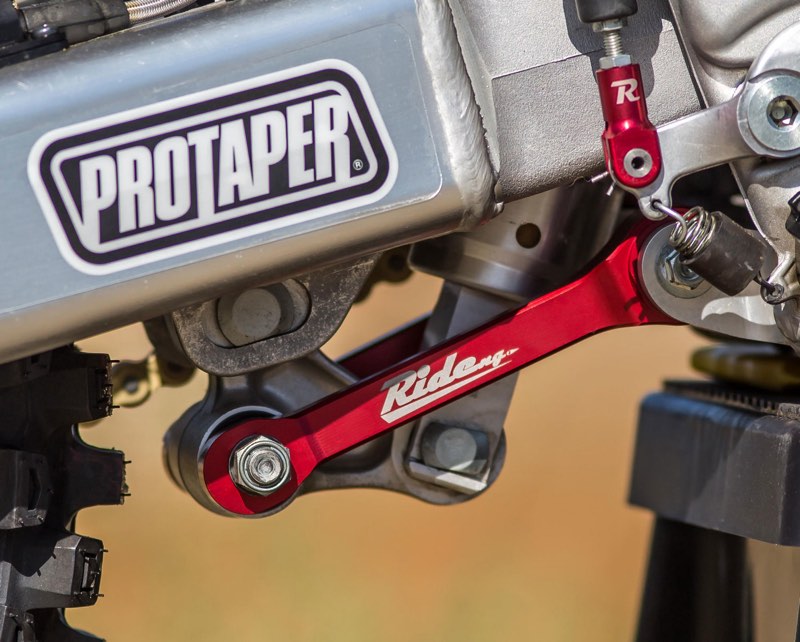Share This Article

Recently I did a podcast on the 2017 Honda CRF450R and all of the modifications I have done to it to make it an even better machine to ride. With the stock set up, the Honda can feel slightly stink bug on de-cel and can cause some oversteer (or knifing) on entrance of corners. You can remedy some of this with dropping the fork down in the clamps from 5mm to 2mm, but I felt like I still wanted some increased stability when coming into corners.
One of the modifications that I feel has made a big improvement on the 2017 Honda’s handing character are the Ride Engineering 1mm longer pull rods. After trying all different sizes of pull rod lengths I feel like Ride Engineering did a good job with the 1mm increased length they came up with. The 1mm length helps settle the rear end down coming into corners (on de-cel) and helps the initial lean into ruts. The understeer that I felt at times through mid corner with the stock link has diminished with the extra length that Ride Engineering came up with. With the Ride Engineering pull rod I am still running anywhere between 104-106mm of sag, but now the Honda feels more planted and less reactive on the track. There was never a time where I was riding the stock 2017 CRF450R and said to myself “I wish this bike cornered better”. I felt like I always wanted a little more consistent and stable Honda rather than the super quick handling character that it comes with. With the Ride Engineering pull rod the Honda has more traction and less of a harsh feeling coming out of choppy ruts and doesn’t have as much pitching feeling on de-cel. The quick handing of the Honda is still there through corners with the 1mm longer pull rod, but with a little less of a reactive (or twitchy) feeling on faster parts of the track (think 3rd gear, sweeping corners, choppy straights, braking bumps).

The only thing you guys might want to do after purchasing this link is experiment with sag. I started out with 106mm of sag and although that was good on faster type tracks with choppy straights and sweeping corners (with berms), it didn’t work as well on tighter more hard pack tracks. I wanted a little more front end bite in the middle of corners and went with a sag setting of 104mm. This was a good setting on most tracks I rode in Southern California. I still left the fork height at 2mm with the Ride Engineering link and the Honda still turns great, but you can experiment with raising it up to 3mm if you feel like you want a little better cornering character. The rear end of the CRF450R also reacts a little slower (more of a dead feeling) when charging hard into braking bumps compared to the stock pull rods. With the stock pull rods I had a slight kicking sensation when hitting bigger braking bumps (at speed) and it is tough to get rid of that sensation (even when adjusting the rebound or high speed compression). The longer pull rod settles the rear end down just a little to where the rear end stays flatter over braking bumps (better ride attitude).
For $199.95, this is a good modification to do to your 2017 CRF450R to help increase stability and gain a little more confidence. I have tried several lengths of pull rods and this 1mm length is the “happy number” where the Honda sees the most improvements almost everywhere on the track. If you have a re-valved suspension set up this pull rod is still very useful, but you will have to make sure your suspension shop didn’t internally shorten your shock. This link may not work for shortened shocks as it would ride too low in the rear and cause harshness.
Don’t forget to listen to the 2017 Honda CRF450R wrap up podcast that I did to hear all about the other modifications that you can make to your Honda. You can check it out on iTunes, Stitcher and pulpmx.com.
If you have any questions about this test please feel free to email me at kris@keeferinctesting.com
